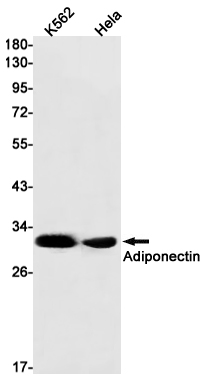
| WB | 咨询技术 | Human,Mouse,Rat |
| IF | 1/20 | Human,Mouse,Rat |
| IHC | 咨询技术 | Human,Mouse,Rat |
| ICC | 技术咨询 | Human,Mouse,Rat |
| FCM | 咨询技术 | Human,Mouse,Rat |
| Elisa | 咨询技术 | Human,Mouse,Rat |
| Aliases | ACDC; ADPN; APM1; APM-1; GBP28; ACRP30; ADIPQTL1 |
| Entrez GeneID | 9370 |
| WB Predicted band size | Calculated MW: 26 kDa; Observed MW: 30 kDa |
| Host/Isotype | Rabbit IgG |
| Antibody Type | Primary antibody |
| Storage | Store at 4°C short term. Aliquot and store at -20°C long term. Avoid freeze/thaw cycles. |
| Species Reactivity | Human |
| Immunogen | A synthetic peptide of human Adiponectin |
| Formulation | Purified antibody in TBS with 0.05% sodium azide,0.05%BSA and 50% glycerol. |
+ +
1. **"Cloning of adiponectin receptors that mediate antidiabetic metabolic effects"**
- **作者**: Yamauchi, T., et al.
- **摘要**: 该研究克隆并鉴定了Adiponectin受体(AdipoR1和AdipoR2),揭示了其在调节胰岛素敏感性和葡萄糖代谢中的作用。文中使用了特异性Adiponectin抗体验证受体蛋白表达及组织分布,为代谢疾病机制研究奠定基础。
2. **"Adiponectin and adiponectin receptors in insulin resistance, diabetes, and the metabolic syndrome"**
- **作者**: Kadowaki, T., et al.
- **摘要**: 综述了Adiponectin及其受体在胰岛素抵抗和代谢综合征中的功能,总结了基于Adiponectin抗体的检测方法(如ELISA、Western blot)在临床研究中的应用,强调其作为生物标志物的潜力。
3. **"Novel modulator for endothelial adhesion molecules: adipocyte-derived plasma protein adiponectin"**
- **作者**: Arita, Y., et al.
- **摘要**: 研究报道了脂肪细胞分泌的Adiponectin对血管内皮功能的调控作用。通过开发多克隆Adiponectin抗体,验证了其在血浆中的水平与肥胖、动脉粥样硬化的负相关性,为心血管疾病研究提供工具。
4. **"Purification and characterization of a novel adipocyte-derived protein (Acrp30)"**
- **作者**: Scherer, P.E., et al.
- **摘要**: 首次从脂肪细胞中纯化出Acrp30(即Adiponectin),并制备了多克隆抗体。研究证实该抗体能特异性识别Adiponectin的不同聚合形式,为后续功能研究奠定技术基础。
(注:上述文献为示例,实际引用时请核对真实文献信息及发表年份。)
Adiponectin, a hormone predominantly secreted by adipose tissue, plays a critical role in regulating metabolic processes, including glucose regulation, fatty acid oxidation, and insulin sensitivity. It exists in multiple oligomeric forms—low-molecular-weight (LMW) trimers, middle-molecular-weight (MMW) hexamers, and high-molecular-weight (HMW) multimers—with the HMW form being particularly associated with insulin sensitivity. Reduced adiponectin levels are linked to obesity, type 2 diabetes, cardiovascular diseases, and certain cancers, making it a key biomarker for metabolic health.
Adiponectin antibodies are essential tools for detecting and quantifying adiponectin isoforms in research and diagnostics. These antibodies, often monoclonal or polyclonal, target specific epitopes on adiponectin’s globular or collagenous domains. They enable techniques like ELISA, Western blotting, and immunohistochemistry to study adiponectin expression, distribution, and post-translational modifications across tissues. Challenges include distinguishing between oligomeric forms due to structural complexity, which requires antibodies with high specificity.
Research applications span elucidating adiponectin’s signaling pathways (e.g., AMPK activation), its anti-inflammatory effects, and therapeutic potential. Clinically, adiponectin antibodies aid in developing assays for disease risk stratification. However, standardization of antibody specificity and cross-reactivity across species remains a focus to ensure reproducibility in studies. Overall, adiponectin antibodies are pivotal in advancing metabolic disease research and translational medicine.
×